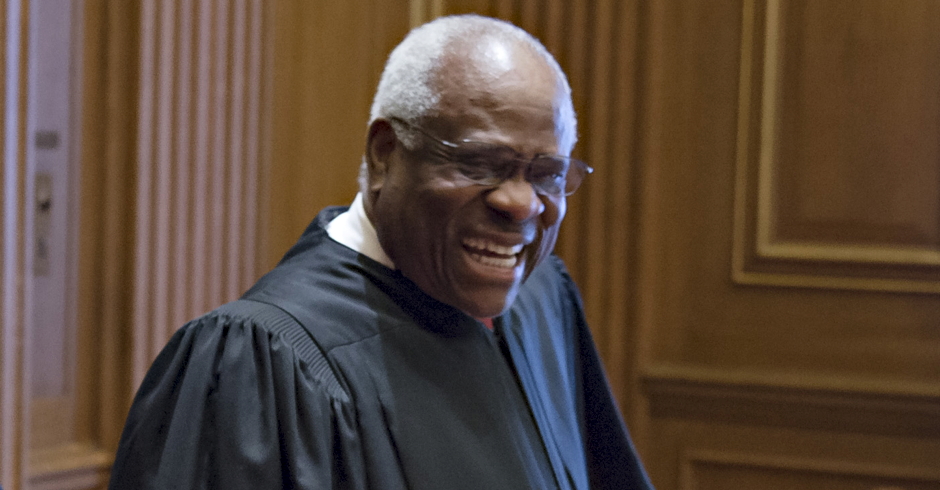News
How Harlan Crow Slashed His Tax Bill by Taking Clarence Thomas on Superyacht Cruises

This story was originally published by ProPublica.
ProPublica is a Pulitzer Prize-winning investigative newsroom. Sign up for The Big Story newsletter to receive stories like this one in your inbox.
Series: Friends of the Court
SCOTUS Justices’ Beneficial Relationships With Billionaire Donors
For months, Harlan Crow and members of Congress have been engaged in a fight over whether the billionaire needs to divulge details about his gifts to Supreme Court Justice Clarence Thomas, including globe-trotting trips aboard his 162-foot yacht, the Michaela Rose.
Crow’s lawyer argues that Congress has no authority to probe the GOP donor’s generosity and that doing so violates a constitutional separation of powers between Congress and the Supreme Court.
Members of Congress say there are federal tax laws underlying their interest and a known propensity by the ultrarich to use their yachts to skirt those laws.
Tax data obtained by ProPublica provides a glimpse of what congressional investigators would find if Crow were to open his books to them. Crow’s voyages with Thomas, the data shows, contributed to a nice side benefit: They helped reduce Crow’s tax bill.
The rich, as we’ve reported, often deduct millions of dollars from their taxes related to buying and operating their jets and yachts. Crow followed that formula through a company that purported to charter his superyacht. But a closer examination of how Crow used the yacht raises questions about his compliance with the tax code, experts said. Despite Crow’s representations to the IRS, ProPublica reporters could find no evidence that his yacht company was actually a profit-seeking business, as the law requires.
“Based on what information is available, this has the look of a textbook billionaire tax scam,” said Senate Finance Committee chair Ron Wyden, D-Ore. “These new details only raise more questions about Mr. Crow’s tax practices, which could begin to explain why he’s been stonewalling the Finance Committee’s investigation for months.”
Crow, through a spokesperson, declined to respond to ProPublica’s questions.
As ProPublica reported in April, Crow lavished gifts on Thomas for over 20 years, often in the form of luxury trips on Crow’s jet and yacht. One focus of the investigations is whether Crow disclosed his generosity toward Thomas to the IRS, since large gifts are subject to the gift tax. Another is whether Crow treated his trips with Thomas as deductible business expenses. (While the data sheds light on how Crow might have accounted for Thomas’ trips, there are no clear implications for Thomas’ own taxes, experts said.)
Crow’s entry into the world of superyacht owners came nearly 40 years ago. By 1984, his father, Trammell Crow, had forged his real estate fortune, and Harlan, then in his 30s, was taking an increasing role in the family business. That year, father and son worked together to erect the 50-story Trammell Crow Center in downtown Dallas. They also formed a company, Rochelle Charter Inc., with the purpose of leasing out their new yacht, the Michaela Rose.
ProPublica’s trove of IRS data, which contains tax information for thousands of wealthy individuals, includes both Harlan Crow and his parents, who filed jointly. The data shows his parents with a majority share in Rochelle Charter. After they both died, Harlan Crow took full control in 2014.
ProPublica’s data for the company runs from 2003 to 2015. Rochelle Charter reported losing money in 10 of those 13 years. Overall, the net losses totaled nearly $8 million, with about half flowing to Harlan Crow. By using those deductions to offset income from other sources, the Crows saved on taxes. (The wealthy often find ways to deduct the expense of a private jet; the records don’t make it clear whether Crow is doing so.)
For Crow, the tax breaks from his yacht were just one way he was able to achieve a lighter tax burden. The tax code is particularly friendly to commercial real estate titans, and Crow generally enjoyed low taxes during that same period: He paid an average income tax rate of 15%, according to the IRS data. It’s a rate typical of the very wealthiest Americans but lower than the personal federal tax rates of even many middle-income workers.
Crow’s biggest deduction from the Michaela Rose came in 2014, when, after the death of his mother, Crow decided to renovate the yacht. The interior needed updating to fit more contemporary notions of glamour (for one, less gold plating). The work was expensive: Crow’s tax information shows a $1.8 million loss from Rochelle Charter that year.
In order to claim these sorts of deductions, taxpayers must be engaged in a real business, one that’s actually trying to make a profit. If expenses dwarf revenues year after year, the IRS might conclude the activity is more of a hobby. That could lead to the deductions being disallowed, plus penalties. Nevertheless, the ultrawealthy often pass off their costly pastimes, like horse racing, as profit-seeking businesses. In doing so, they essentially dare the IRS to prove otherwise in an audit.
For a yacht owner to meet the legal standard of operating a for-profit business, said Michael Kosnitzky, co-chair of the private client and family office group at the law firm Pillsbury Winthrop, “You have to be regularly chartering the yacht to third parties at fair market value,” typically through an independent charter broker.
ProPublica interviewed around a dozen former crew members of the Michaela Rose, some of whom spent years aboard the ship, and none said they were aware of the boat ever being chartered. ProPublica also reviewed cruising schedules for three different years. According to the former staff and the schedules, use of the vessel appears to have been limited to Crow’s family, friends and executives of Crow’s company, along with their guests.
Moreover, in an attempt to trademark the name of his yacht, Crow struggled to provide evidence that he chartered his ship. In 2019, an attorney representing Rochelle Charter filed an application with the U.S. Patent and Trademark Office for the request. This required demonstrating commercial use of the name Michaela Rose. The attorney, of the law firm Locke Lord, wrote that the name was used for “yacht charter services for entertainment purposes” and as evidence attached a brochure.
“This magnificent yacht has cruised the oceans of the world with a graceful and gentle motion found only on the most superior seagoing vessels,” the pamphlet said, and it went on to extoll the vessel’s “fine, seakindly hull” and “mahogany paneled formal dining room” that seats 16. But it said nothing about chartering.
“Registration is refused because the specimen does not show the applied-for mark in use in commerce,” the USPTO’s attorney responded.
Crow’s attorney asked the USPTO to reconsider. The brochure was “provided by Applicant directly to its customers and potential customers,” he wrote. Wasn’t that enough?
When USPTO again refused, the attorney provided new evidence: screenshots of the websites superyachts.com and liveyachting.com. These show “links and references to yacht ‘Charter’ services offered in connection with Applicant’s MICHAELA ROSE mark,” the attorney wrote.
At this point, the USPTO agreed to approve the trademark, but the evidence was dubious. Hundreds of ships have profiles on superyachts.com whether they are available to charter or not. The LiveYachting page merely encouraged readers to contact a broker “for finding out if she could be offered for yacht charters.”
“Reviewing the file, it’s not clear to me that the yacht was actually offered for use in commerce in a way that would justify a trademark,” said Neel Sukhatme, a professor at Georgetown Law and visiting scholar with USPTO.
Since April, when the Senate Finance Committee first sent Crow a long list of questions about Thomas’ trips on his jet and yacht, Crow has refused to provide extensive answers. But last month, his attorney, Michael Bopp of the law firm Gibson Dunn, did shed some light on how his chartering business worked: Crow leased from himself. (Gibson Dunn is representing ProPublica pro bono in a case against the U.S. Navy.)
For Crow’s personal use of the Michaela Rose, including trips when the Thomases were guests, “charter rates … were paid to the Crow family entities” that owned the yacht, Bopp wrote in a letter to Wyden. The letter did not specify who, if anyone, paid when Crow’s friends, family or employees used the vessel or how he determined the charter rate. Crow’s spokesperson declined to clarify these details.
According to Bopp, then, whenever Crow used his yacht, Crow (or one of his businesses) would pay his own company, Rochelle Charter, and Rochelle Charter would put that down as revenue. On the other side of the ledger would go the considerable expenses of operating the yacht: maintenance, crew, fuel and other costs. If, at the end of the year, Rochelle Charter’s revenue from chartering exceeded those expenses, Crow would pay tax on that income.
But the taxes of the ultrawealthy often have an up-is-down quality. The clear incentive is to welcome losses, not profits. If, as happened most years for which ProPublica has data, Rochelle Charter’s expenses far exceeded revenue, Crow would save on taxes.
These sorts of arrangements “should be aggressively audited,” said Brian Galle, a professor at Georgetown Law and former federal prosecutor of tax crimes.
“Assuming that the uses of the yacht are mostly personal, Crow should not be able to take a deduction,” he said, calling “absurd” the idea that “the more personal use you get from the yacht, the more deduction you get to claim.”
Crow treated personal trips on his jet in a similar fashion, according to his attorney. Wealthy business owners often derive tax savings from their jets, since business-related flights are fully deductible, and the rich can often find ways to blend business and pleasure, as ProPublica has reported. The company that owns Crow’s jet is not in ProPublica’s data set, so it’s unclear if it reported net losses.
Bopp’s letter describes the standard way that jet owners account for nonbusiness guests: “Reimbursements at rates prescribed by law,” he wrote, were paid to the Crow business that owned his jet. The IRS has a “Standard Industry Fare Level” that jet owners use to calculate the value of a seat aboard a jet for any trip. The amount is roughly equivalent to the cost of a first-class commercial ticket, far below what it would actually cost to charter a jet.
The Senate investigation has also focused on an entirely different tax question: Given that Thomas’ trips on Crow’s jets and yachts could easily be valued in the hundreds of thousands of dollars, did Crow report them to the IRS as taxable gifts?
For each year that Crow gave gifts to someone that exceeded a certain threshold ($17,000 in 2023), he was required to file a gift tax return. That might or might not have resulted in a tax bill for Crow, depending on how much he’d already given to others over the course of his life. (The lifetime limit for total gifts is $12.9 million in 2023.)
But, according to Bopp’s letter, Crow didn’t consider the trips reportable. The gift tax, Bopp wrote, was created to prevent people from avoiding the estate tax by simply giving away assets before death. But Crow still owned his jet and yacht after hosting Thomas. “Value [was] not transferred out of the hosts’ taxable estates,” he argued. Therefore, no gift tax.
Tax experts told ProPublica, on the contrary, that these sorts of luxury trips should be analyzed as gifts.
Beth Kaufman, a partner with Lowenstein Sandler who specializes in estate planning and a veteran of the Treasury Department’s Office of Tax Policy, said she’d counseled clients on the issue. After one couple took their extended family on an exotic vacation, she said, she helped them calculate the reportable costs and file a gift tax return.
However, taxpayers rarely report these sorts of trips, experts said. One important factor is that the IRS has no way of knowing about gifts like these unless they happen to be uncovered in an audit. The agency has also signaled no interest in scrutinizing these kinds of interactions. In fact, experts weren’t aware of any audits related to gifts of this kind.
The result is a situation where, counterintuitively, the gift tax can be easier to avoid the richer the host is.
As explained in a recent paper by two law professors and a private practitioner, everyone agrees that giving $500,000 to a friend would necessitate filing a gift tax return for that amount. Using that $500,000 to buy an all-expense-paid yacht cruise for friends would be treated no differently. But if someone owns a luxury yacht and takes their friends on a cruise, the situation gets muddy. Crow’s attorney even argues there was no gift at all.
That “doesn’t square with fundamental notions of fairness,” said Bridget Crawford, one of the paper’s authors and a professor at Pace Law School.
How to apportion the costs for Crow and his guests is debatable, Crawford said. Crow might argue he would have gone on the cruise without his friends anyway, but at the very least, she said, some portion of the costs of the trip (e.g., the crew and food) should be allocated to his guests.
She and her co-authors urged Congress and the IRS to make it clear these sorts of gifts should be disclosed and provide guidelines for valuing them.
“A lot of these tax rules were developed in an era where there were a few millionaires and the tiniest number of billionaires,” Crawford said, “and now there are many. This is becoming a more visible problem.”
Enjoy this piece?
… then let us make a small request. The New Civil Rights Movement depends on readers like you to meet our ongoing expenses and continue producing quality progressive journalism. Three Silicon Valley giants consume 70 percent of all online advertising dollars, so we need your help to continue doing what we do.
NCRM is independent. You won’t find mainstream media bias here. From unflinching coverage of religious extremism, to spotlighting efforts to roll back our rights, NCRM continues to speak truth to power. America needs independent voices like NCRM to be sure no one is forgotten.
Every reader contribution, whatever the amount, makes a tremendous difference. Help ensure NCRM remains independent long into the future. Support progressive journalism with a one-time contribution to NCRM, or click here to become a subscriber. Thank you. Click here to donate by check.
 |















